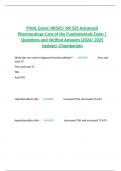FINAL Exam: NR565/ NR 565 Advanced
Pharmacology Care of the Fundamentals Exam |
Questions and Verified Answers (2024/ 2025
Update)- Chamberlain
What labs are used to diagnose thyroid problems? - ANSWER Free and
total T3
Free and total T4
TSH
Anti-TPO
Hypothyroidism labs - ANSWER increased TSH, decreased T3 &T4
hyperthyroidism labs - ANSWER decreased TSH and increased T3 &T4
,When to recheck labs after starting levothyroxine? - ANSWER 6-8 weeks
or after dose change, then 12 months once stabilized
S/S hypothyroidism - ANSWER pale, puffy, and expressionless face, cold
and dry skin, brittle hair/hair loss, low heart rate and body temperature, lethargy,
fatigue, cold intolerance, mental status changes, thyroid enlargement
Think "hypo low and slow"
S/S hyperthyroidism - ANSWER strong and rapid heart rate,
dysrhythmias, angina, nervousness, insomnia, rapid thought flow and speech,
muscle weakness/atrophy, increased metabolic rate (increased heat production,
increased body temperature, heat intolerance), warm/moist skin, increased
appetite, weight loss despite increased caloric intake
think "hyper as in fast"
result of not treating hypothyroidism during pregnancy - ANSWER
permanent neuropsychological deficits in the child. First trimester: fetus unable to
produce their own thyroid hormones. Fetal thyroid gland is fully functional in the
second trimester.
, Medication to treat SYMPTOMS of hyperthyroidism - ANSWER beta
blocker (decrease HR)
non-radioactive iodine
How to take levothyroxine with food? - ANSWER take on an empty
stomach in the morning, 30-60 minutes before breakfast
Supplement/drug interactions with levothyroxine - ANSWER antacids,
iron, calcium
Confirm diabetes diagnosis prior to treatment - ANSWER fasting plasma
glucose greater than or equal to 126, A random plasma glucose of greater than or
equal to 200 plus symptoms of diabetes, an oral glucose tolerance test of two
hours, plasma glucose of greater than or equal to 200, or a hemoglobin A1c, a 6.5
or higher (on two occasions)




